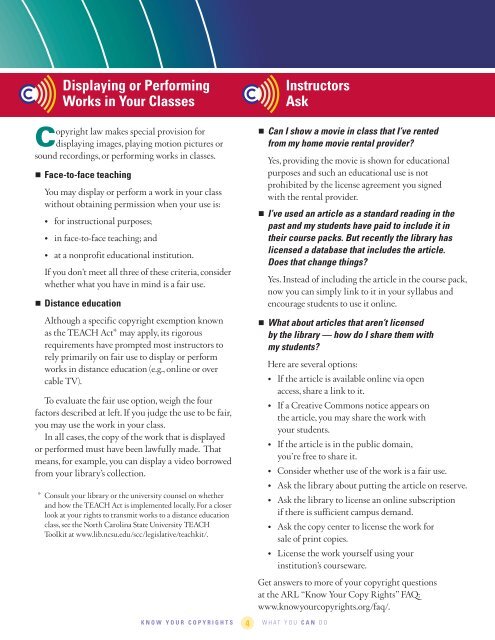Know Your Copy Rights What You Can Do
Create successful ePaper yourself
Turn your PDF publications into a flip-book with our unique Google optimized e-Paper software.
Displaying or Performing<br />
Works in <strong><strong>You</strong>r</strong> Classes<br />
<strong>Copy</strong>right law makes special provision for<br />
displaying images, playing motion pictures or<br />
sound recordings, or performing works in classes.<br />
Face-to-face teaching<br />
<strong>You</strong> may display or perform a work in your class<br />
without obtaining permission when your use is:<br />
• for instructional purposes;<br />
• in face-to-face teaching; and<br />
• at a nonprofit educational institution.<br />
If you don’t meet all three of these criteria, consider<br />
whether what you have in mind is a fair use.<br />
Distance education<br />
Although a specific copyright exemption known<br />
as the TEACH Act* may apply, its rigorous<br />
requirements have prompted most instructors to<br />
rely primarily on fair use to display or perform<br />
works in distance education (e.g., online or over<br />
cable TV).<br />
To evaluate the fair use option, weigh the four<br />
factors described at left. If you judge the use to be fair,<br />
you may use the work in your class.<br />
In all cases, the copy of the work that is displayed<br />
or performed must have been lawfully made. That<br />
means, for example, you can display a video borrowed<br />
from your library’s collection.<br />
* Consult your library or the university counsel on whether<br />
and how the TEACH Act is implemented locally. For a closer<br />
look at your rights to transmit works to a distance education<br />
class, see the North Carolina State University TEACH<br />
Toolkit at www.lib.ncsu.edu/scc/legislative/teachkit/.<br />
Instructors<br />
Ask<br />
<strong>Can</strong> I show a movie in class that I’ve rented<br />
from my home movie rental provider?<br />
Yes, providing the movie is shown for educational<br />
purposes and such an educational use is not<br />
prohibited by the license agreement you signed<br />
with the rental provider.<br />
I’ve used an article as a standard reading in the<br />
past and my students have paid to include it in<br />
their course packs. But recently the library has<br />
licensed a database that includes the article.<br />
<strong>Do</strong>es that change things?<br />
Yes. Instead of including the article in the course pack,<br />
now you can simply link to it in your syllabus and<br />
encourage students to use it online.<br />
<strong>What</strong> about articles that aren’t licensed<br />
by the library — how do I share them with<br />
my students?<br />
Here are several options:<br />
• If the article is available online via open<br />
access, share a link to it.<br />
• If a Creative Commons notice appears on<br />
the article, you may share the work with<br />
your students.<br />
• If the article is in the public domain,<br />
you’re free to share it.<br />
• Consider whether use of the work is a fair use.<br />
• Ask the library about putting the article on reserve.<br />
• Ask the library to license an online subscription<br />
if there is sufficient campus demand.<br />
• Ask the copy center to license the work for<br />
sale of print copies.<br />
• License the work yourself using your<br />
institution’s courseware.<br />
Get answers to more of your copyright questions<br />
at the ARL “<strong>Know</strong> <strong><strong>You</strong>r</strong> <strong>Copy</strong> <strong>Rights</strong>” FAQ:<br />
www.knowyourcopyrights.org/faq/.<br />
KNOW YOUR COPYRIGHTS 4 WHAT YOU CAN DO



